#devil’s candy clarence
Explore tagged Tumblr posts
Text

clarence is soooo interesting to me bro i just wanna put him under a microscope and study him for hours i have soooo many questions.
like??? are his parents straight edge too or is it just him?? and if it’s just him what MADE be like “nahh.” and choose to become straight edge??
why doesn’t he have claws like kazu?? i get that they’re different types of vampires but what even IS a nosferatu??? google said it’s just another word for vampire 😭 do imps outrank nosferatu or vise versa??
he likes cooking things that can be enjoyed by all devils INCLUDING nosferatus and in any art we see of everyone eating, he’s usually just drinking a blood bag so does that mean he literally can’t eat/digest certain foods unless they’re made with his devil type in mind?? is bro not hungry??
bc we often we kazu eating loads of different things but once again they’re different devil types so ig i can’t keep comparing them i just idk RAH


it seems clarence’s biggest issue is having to take the blood straight from the source (hence why he’s always drinking from bags) and ik that both nosferatu blood and mandragora fruits are life forces but i wonder if clarence would’ve gotten the same effect from drinking yahgie’s blood since he’s not either of those devil types??
i think i recall yahgie saying some of his own blood was mixed into the ramen as well but it was the nosferatu/mandragora mix that made clarence go into blood rapture, yahgie’s blood likely just being an added strength bonus. i recall clarence mentioning that he's weaker than pandy bc of the type of blood he drinks, but when they went on the field trip he wasn't put in the group with weak devils like nemo and kazu.


and from the action panels of clarence vs kaiko, he seems to understand how to use these power ups. this plus the panel where he says “no one should have this power.” and talks about how it disgusts him, makes me guess that this isn’t the first time he’s gone into rapture.
i just wonder what he’s seen or heard or even DONE himself that made him so against utilizing his powers?? and if i’m remembering correctly, in the flashbacks/arts we’ve seen of baby clarence he didn’t have the straight edge tattoo and neither did his parents, one of which who can FLY (his mama), so i’m assuming that this was a recent decision he made when he was older??
also if he drank fresh devil blood would he be able to fly on the regular like his mom?? and do non-straight edge nosferatu vamps just go around biting folks for fresh food?? like I'D HAVE AN ISSUE WITH THAT TOO PROBABLY
HE’S JUST???? SO INTERESTING I WANNA KNOW mORE ABOUT HIMMMMMM I JUST???? I LOVE HIM SM ANSWER MY MANY QUERIES @devilscandycomic PLS IM BEGGING SOMEONE ANYONE
*collapses to my knees in anguish and sobs*
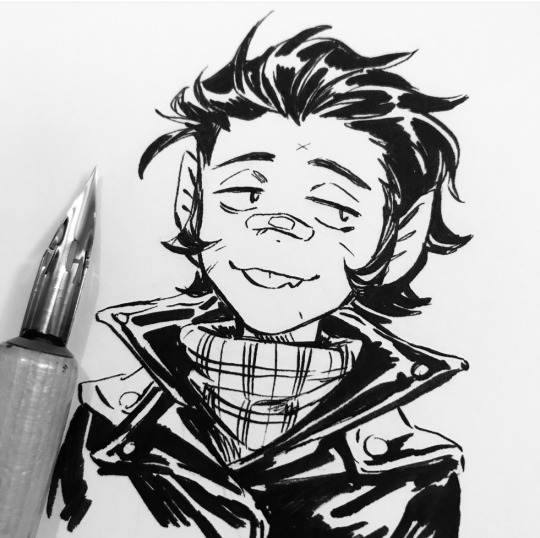
anyway all art/panels taken from the official devil’s candy site (where it can be read for free!!!!) or tsuala’s insta/twitter!!
also the next volume drops in july and my boy’s on the spine and front cover let’s heckin goooo 🙂↕️🙂↕️🙂↕️
#devil’s candy comic#devil’s candy#clarence r. nosophoros#devil’s candy clarence#devils candy webcomic#devils candy manga#thegreatspuukiiz#i love him#HES SO COOL AND CUTE AND INTERESTING I JUST RAHHHHHHHH#manga analysis#kinda#character study#in a way#i’m just insane#he’s so pookie#GIVE US MORE CLARENCE#PLS IM BEGGING#i am obsessed#devilscandycomic#go read it#it’s peak#clarence world domination#spuukiizyappin#the next volume will have lots of clarence so me is very hype
24 notes
·
View notes
Text
me with devils candy. everyone back off i, THE GREAT N POWERFUL SPUUKIIZ, am the number one clarence r. nosophoros fan and i shan’t hear any arguments!

if you think you’re a bigger fan of this guy than me, you’re simply wrong!! (i’m yelling into a void bc the fandom is borderline nonexistent)

#spuukiizyappin#devilscandycomic#clarence r. nosophoros#devil’s candy clarence#clarence i love you#devils candy comic#devils candy webcomic
13K notes
·
View notes
Text
🇸🇹🇺🇵🇮🇩 𝕕𝕖𝕧𝕚𝕝'𝕤 𝕔𝕒𝕟𝕕𝕪 🇭🇪🇦🇩🇨🇦🇳🇳🇴🇳🇸
╰┈➤yahgie

2𝘊 𝘩𝘢����𝘳
𝘣𝘳𝘦𝘢𝘬𝘴 𝘤𝘰𝘮𝘣𝘴 𝘰𝘯 𝘵𝘩𝘦 𝘳𝘦𝘨𝘶𝘭𝘢𝘳
𝘸𝘦𝘢𝘳𝘴 𝘤𝘰𝘭𝘰𝘨𝘰𝘯𝘦, 𝘵𝘩𝘦 𝘭𝘰𝘶𝘥, 𝘴𝘵𝘳𝘰𝘯𝘨 𝘪𝘯 𝘺𝘰𝘶𝘳 𝘧𝘢𝘤𝘦 𝘬𝘪𝘯𝘥
𝘩𝘦 𝘵𝘰𝘯𝘦𝘥 𝘪𝘵 𝘥𝘰𝘸𝘯 𝘢𝘧𝘵𝘦𝘳 𝘤𝘭𝘢𝘳𝘦𝘯𝘤𝘦 𝘴𝘢𝘵 𝘩𝘪𝘮 𝘥𝘰𝘸𝘯 𝘢𝘯𝘥 𝘵𝘢𝘭𝘬𝘦𝘥 𝘵𝘰 𝘩𝘪𝘮 𝘢𝘣𝘰𝘶𝘵 𝘪𝘵
𝘩𝘢𝘴 𝘢𝘸𝘦𝘴𝘰𝘮𝘦 𝘤𝘰𝘮𝘦𝘣𝘢𝘤𝘬𝘴 𝘥𝘦𝘴𝘱𝘪𝘵𝘦 𝘣𝘦𝘪𝘯𝘨 𝘥𝘶𝘮𝘣 𝘢𝘴 𝘢 𝘣𝘰𝘹 𝘰𝘧 𝘳𝘰𝘤𝘬𝘴
𝘴𝘰𝘮𝘦𝘵𝘪𝘮𝘦𝘴 𝘧𝘰𝘳𝘨𝘦𝘵𝘴 𝘵𝘩𝘢𝘵 𝘳𝘪𝘤𝘬𝘦𝘵 𝘪𝘴 𝘢 𝘨𝘪𝘳𝘭
"𝘣𝘳𝘰 𝘸𝘩𝘢𝘢𝘢𝘵…"
𝘤𝘢𝘭𝘭𝘴 𝘤𝘭𝘢𝘳𝘦𝘯𝘤𝘦 "𝘤𝘭𝘢𝘳𝘦-𝘣𝘦𝘢𝘳" 𝘵𝘰 𝘵𝘦𝘢𝘴𝘦 𝘩𝘪𝘮
╰┈➤ clarence
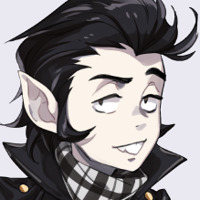
𝘥𝘰𝘦𝘴 𝘧𝘪𝘧𝘵𝘺 𝘱𝘶𝘴𝘩𝘶𝘱𝘴 𝘦𝘷𝘦𝘳𝘺 𝘥𝘢𝘺
𝘩𝘪𝘴 𝘣𝘳𝘢𝘪𝘯 𝘪𝘴 85% 𝘱𝘢𝘯𝘥𝘰𝘳𝘢, 15% 𝘦𝘷𝘦𝘳𝘺𝘵𝘩𝘪𝘯𝘨 𝘦𝘭𝘴𝘦
𝘩𝘪𝘴 𝘩𝘢𝘪𝘳 𝘨𝘳𝘰𝘸𝘴 𝘳𝘦𝘢𝘭𝘭𝘺 𝘧𝘢𝘴𝘵 𝘴𝘰 𝘩𝘦 𝘨𝘦𝘵𝘴 𝘪𝘵 𝘤𝘶𝘵 𝘰𝘧𝘵𝘦𝘯
𝘳𝘦𝘢𝘭𝘭𝘺 𝘸𝘢𝘯𝘵𝘴 𝘢𝘯 𝘦𝘺𝘦𝘣𝘳𝘰𝘸 𝘱𝘪𝘦𝘳𝘤𝘪𝘯𝘨 𝘣𝘶𝘵 𝘩𝘪𝘴 𝘧𝘰𝘭𝘬𝘴 𝘬𝘦𝘦𝘱 𝘴𝘢𝘺𝘪𝘯𝘨 𝘯𝘰 𝘭𝘰𝘭
𝘩𝘢𝘴 𝘢 𝘩𝘦𝘢𝘳𝘵𝘴𝘩𝘢𝘱𝘦𝘥 𝘣𝘪𝘳𝘵𝘩𝘮𝘢𝘳𝘬 𝘰𝘯 𝘩𝘪𝘴 𝘴𝘩𝘰𝘶𝘭𝘥𝘦𝘳
𝘤𝘩𝘪𝘭𝘥𝘩𝘰𝘰𝘥 𝘯𝘪𝘤𝘬𝘯𝘢𝘮𝘦 𝘸𝘢𝘴 "𝘤𝘭𝘢𝘳𝘦-𝘣𝘦𝘢𝘳"
𝘤𝘢𝘭𝘭𝘴 𝘱𝘦𝘰𝘱𝘭𝘦 𝘣𝘶𝘥𝘥𝘺 𝘢 𝘭𝘰𝘵
𝘮𝘰𝘴𝘵𝘭𝘺 𝘺𝘢𝘩𝘨𝘪𝘦
╰┈➤ pandora

𝘸𝘰𝘶𝘭𝘥 𝘱𝘪𝘤𝘬 𝘩𝘦𝘳 𝘯𝘰𝘴𝘦 𝘢𝘯𝘥 𝘸𝘪𝘱𝘦 𝘪𝘵 𝘰𝘯 𝘬𝘢𝘻𝘶
𝘳𝘦𝘢𝘭𝘭𝘺 𝘭𝘰𝘷𝘦𝘴 𝘨𝘪𝘳𝘭𝘺/𝘭𝘰𝘭𝘪𝘵𝘢 𝘤𝘭𝘰𝘵𝘩𝘦𝘴
𝘮𝘢𝘯𝘴𝘱𝘳𝘦𝘢𝘥𝘪𝘯𝘨 𝘪𝘴 𝘩𝘦𝘳 𝘥𝘦𝘧𝘢𝘶𝘭𝘵 𝘴𝘪𝘵𝘵𝘪𝘯𝘨 𝘱𝘰𝘴𝘵𝘪𝘰𝘯
𝘩𝘢𝘴 𝘪𝘯𝘴𝘢𝘯𝘦𝘭𝘺 𝘭𝘰𝘶𝘥 𝘣𝘶𝘳𝘱𝘴
𝘦𝘢𝘵𝘴 𝘳𝘢𝘸 𝘤𝘢𝘬𝘦 𝘧𝘳𝘰𝘴𝘵𝘪𝘯𝘨 𝘧𝘳𝘰𝘮 𝘵𝘩𝘦 𝘵𝘶𝘣𝘦
𝘴𝘭𝘦𝘦𝘱𝘺, 𝘯𝘢𝘱𝘴 𝘢 𝘭𝘰𝘵
𝘴𝘯𝘦𝘢𝘬𝘴 𝘳𝘢𝘸 𝘤𝘢𝘬𝘦 𝘣𝘢𝘵𝘵𝘦𝘳 𝘸𝘩𝘦𝘯 𝘯𝘰 𝘰𝘯𝘦'𝘴 𝘭𝘰𝘰𝘬𝘪𝘯𝘨 𝘢𝘯𝘥 𝘭𝘪𝘤𝘬𝘴 𝘵𝘩𝘦 𝘴𝘱𝘰𝘰𝘯 𝘸𝘩𝘪𝘭𝘦 𝘪𝘵 𝘣𝘢𝘬𝘦𝘴
𝘨𝘪𝘷𝘦𝘴 𝘢 𝘭𝘰𝘵 𝘰𝘧 𝘩𝘦𝘢𝘥𝘱𝘢𝘵𝘴
╰┈➤ kazu

𝘱𝘳𝘰𝘶𝘥 𝘵𝘩𝘦𝘢𝘵𝘦𝘳 𝘬𝘪𝘥, 𝘩𝘦 𝘤𝘢𝘯 𝘴𝘪𝘯𝘨 𝘳𝘦𝘢𝘭𝘭𝘺 𝘸𝘦𝘭𝘭 𝘣𝘶𝘵 𝘤𝘢𝘯𝘯𝘰𝘵 𝘢𝘤𝘵
𝘭𝘪𝘬𝘦 𝘞𝘖𝘖𝘍 𝘩𝘦'𝘴 𝘢𝘸𝘧𝘶𝘭
𝘤𝘢𝘯 𝘣𝘢𝘭𝘭𝘳𝘰𝘰𝘮 𝘥𝘢𝘯𝘤𝘦 𝘢𝘯𝘥 𝘵𝘢𝘱 𝘥𝘢𝘯𝘤𝘦
𝘳𝘦𝘢𝘥𝘴 𝘢𝘯𝘥 𝘸𝘳𝘪𝘵𝘦𝘴 𝘥𝘦𝘷𝘪𝘭𝘪𝘻𝘦𝘳 𝘧𝘢𝘯𝘧𝘪𝘤𝘴
𝘵𝘩𝘰𝘶𝘨𝘩𝘵 "𝘭𝘰𝘭' 𝘮𝘦𝘢𝘯𝘵 "𝘭𝘰𝘵𝘴 𝘰𝘧 𝘭𝘰𝘷𝘦"
𝘰𝘯𝘤𝘦 𝘵𝘦𝘹𝘵𝘦𝘥 𝘦𝘭𝘭𝘪𝘰𝘵 "𝘪'𝘮 𝘴𝘰 𝘴𝘰𝘳𝘳𝘺 𝘵𝘰 𝘩𝘦𝘢𝘳 𝘵𝘩𝘢𝘵, 𝘭𝘰𝘭 :((("
𝘰𝘯𝘭𝘺 𝘶𝘴𝘦𝘴 𝘦𝘮𝘰𝘵𝘪𝘤𝘰𝘯𝘴
𝘤𝘳𝘪𝘦𝘴 𝘸𝘩𝘦𝘯𝘦𝘷𝘦𝘳 𝘱𝘢𝘯𝘥𝘰𝘳𝘢 𝘨𝘪𝘷𝘦𝘴 𝘩𝘪𝘮 𝘢 𝘩𝘶𝘨
𝘪𝘵 𝘫𝘶𝘴𝘵 𝘮𝘢𝘬𝘦𝘴 𝘩𝘪𝘮 𝘳𝘦𝘢𝘭𝘭𝘺 𝘩𝘢𝘱𝘱𝘺
╰┈➤nemo

𝘨𝘰𝘢𝘵𝘦𝘥 𝘢𝘵 𝘳𝘢𝘤𝘪𝘯𝘨 𝘨𝘢𝘮𝘦𝘴, 𝘵𝘳𝘢𝘴𝘩 𝘢𝘵 𝘤𝘰𝘮𝘣𝘢𝘵 𝘨𝘢𝘮𝘦𝘴
𝘵𝘩𝘪𝘯𝘬𝘴 𝘵𝘩𝘢𝘵 𝘯𝘰 𝘰𝘯𝘦 𝘬𝘯𝘰𝘸𝘴 𝘩𝘦'𝘴 𝘤𝘳𝘶𝘴𝘩𝘪𝘯𝘨 𝘰𝘯 𝘦𝘤𝘩𝘰
𝘩𝘦 𝘬𝘦𝘦𝘱𝘴 𝘢 𝘧𝘦𝘸 𝘦𝘹𝘵𝘳𝘢 𝘰𝘶𝘵𝘧𝘪𝘵𝘴 𝘢𝘵 𝘬𝘢𝘻𝘶'𝘴 𝘩𝘰𝘶𝘴𝘦
𝘩𝘢𝘴 𝘦𝘹𝘱𝘭𝘰𝘴𝘪𝘷𝘦, 𝘦𝘹𝘵𝘳𝘦𝘮𝘦, 𝘪𝘯𝘴𝘢𝘯𝘦 𝘨𝘢𝘮𝘦𝘳 𝘳𝘢𝘨𝘦 𝘧𝘪𝘵𝘴 𝘴𝘰𝘮𝘦𝘵𝘪𝘮𝘦𝘴
𝘴𝘢𝘺𝘴 "𝘦𝘳𝘮, 𝘢𝘤𝘵𝘶𝘢𝘭𝘭𝘺" 𝘸𝘩𝘪𝘭𝘦 𝘳𝘢𝘪𝘴𝘪𝘯𝘨 𝘢 𝘧𝘪𝘯𝘨𝘦𝘳 𝘶𝘯𝘪𝘳𝘰𝘯𝘪𝘤𝘢𝘭𝘭𝘺
𝘸𝘰𝘶𝘭𝘥 𝘥𝘳𝘰𝘱 𝘦𝘷��𝘳𝘺𝘵𝘩𝘪𝘯𝘨 𝘵𝘰 𝘤𝘰𝘮𝘦 𝘴𝘭𝘦𝘦𝘱 𝘰𝘷𝘦𝘳 𝘢𝘵 𝘬𝘢𝘻𝘶'𝘴 𝘸𝘩𝘦𝘷𝘦𝘳 𝘩𝘦 𝘢𝘴𝘬𝘴
𝘴𝘩𝘢𝘬𝘦𝘴 𝘩𝘪𝘴 𝘩𝘦𝘢𝘥 𝘭𝘪𝘬𝘦 𝘢 𝘤𝘢𝘵 𝘢𝘧𝘵𝘦𝘳 𝘺𝘢𝘸𝘯𝘪𝘯𝘨
╰┈➤ hitomi

𝘱𝘪𝘦𝘳𝘤𝘦𝘥 𝘩𝘦𝘳 𝘰𝘸𝘯 𝘦𝘢𝘳𝘴 𝘸𝘩𝘦𝘯 𝘴𝘩𝘦 𝘸𝘢𝘴 𝘭𝘪𝘵𝘵𝘭𝘦
𝘢 𝘨𝘰𝘰𝘥 𝘣𝘢𝘣𝘺𝘴𝘪𝘵𝘵𝘦𝘳, 𝘣𝘶𝘵 𝘴𝘩𝘦 𝘩𝘢𝘵𝘦𝘴 𝘬𝘪𝘥𝘴
𝘭𝘪𝘬𝘦 𝘴𝘩𝘦'𝘭𝘭 𝘨𝘳𝘢𝘣 𝘵𝘩𝘦𝘮 𝘣𝘺 𝘵𝘩𝘦 𝘢𝘯𝘬𝘭𝘦𝘴 𝘢𝘯𝘥 𝘥𝘳𝘢𝘨 𝘵𝘩𝘦𝘮 𝘢𝘳𝘰𝘶𝘯𝘥 𝘭𝘮𝘢𝘰
𝘭𝘪𝘬𝘦𝘴 𝘱𝘭𝘢𝘺𝘪𝘯𝘨 𝘳𝘩𝘺𝘵𝘩𝘮 𝘨𝘢𝘮𝘦𝘴 (𝘴𝘩𝘦'𝘴 𝘨𝘰𝘢𝘵𝘦𝘥)
𝘨𝘰𝘦𝘴 "𝘤𝘩𝘦𝘦𝘴𝘦 𝘢𝘯𝘥 𝘴𝘱𝘳𝘪𝘯𝘬𝘭𝘦𝘴 >:0" 𝘸𝘩𝘦𝘯 𝘴𝘩𝘦'𝘴 𝘢𝘯𝘯𝘰𝘺𝘦𝘥
𝘩𝘢𝘴 𝘭𝘰𝘶𝘥 𝘶𝘯𝘨𝘰𝘥𝘭𝘺 𝘴𝘯𝘦𝘦𝘻𝘦𝘴, 𝘵𝘩𝘦𝘺 𝘴𝘩𝘢𝘬𝘦 𝘳𝘰𝘰𝘮
𝘤𝘰𝘯𝘴𝘵𝘢𝘯𝘵𝘭𝘺 𝘤𝘰𝘮𝘦𝘴 𝘶𝘱 𝘸𝘪𝘵𝘩 𝘥𝘦𝘪𝘴𝘨𝘯𝘴 𝘧𝘰𝘳 𝘩𝘦𝘳 𝘧𝘳𝘪𝘦𝘯𝘥𝘴
𝘱𝘳𝘰𝘵𝘦𝘤𝘵𝘴 𝘩𝘦𝘳 𝘴𝘬𝘦𝘵𝘤𝘩𝘣𝘰𝘰𝘬 𝘸𝘪𝘵𝘩 𝘩𝘦𝘳 𝘭𝘪𝘧𝘦
𝘳𝘪𝘤𝘬𝘦𝘵 𝘵𝘰𝘰𝘬 𝘪𝘵 𝘰𝘯𝘤𝘦 𝘣𝘶𝘵 𝘣𝘦𝘧𝘰𝘳𝘦 𝘴𝘩𝘦 𝘤𝘰𝘶𝘭𝘥 𝘰𝘱𝘦𝘯 𝘪𝘵 𝘴𝘩𝘦'𝘥 𝘣𝘦𝘦𝘯 𝘭𝘢𝘶𝘯𝘤𝘩𝘦𝘥 𝘪𝘯𝘵𝘰 𝘵𝘩𝘦 𝘴𝘬𝘺
𝘩𝘪𝘵𝘰𝘮𝘪 𝘢𝘱𝘰𝘭𝘰𝘨𝘪𝘻𝘦𝘥 𝘢 𝘭𝘰𝘵 𝘵𝘩𝘰
╰┈➤ ricket

𝘵𝘳𝘰𝘭𝘭𝘴 𝘰𝘯 𝘳𝘰𝘣𝘭𝘰𝘹 𝘪𝘯 𝘩𝘦𝘳 𝘧𝘳𝘦𝘦 𝘵𝘪𝘮𝘦
𝘴𝘩𝘦 𝘤𝘶𝘵 𝘩𝘦𝘳 𝘰𝘸𝘯 𝘩𝘢𝘪𝘳
𝘵𝘩𝘢𝘵'𝘴 𝘸𝘩𝘺 𝘩𝘦𝘳 𝘣𝘢𝘯𝘨𝘴 𝘭𝘰𝘰𝘬 𝘭𝘪𝘬𝘦…𝘵𝘩𝘢𝘵
𝘴𝘮𝘰𝘰𝘵𝘩𝘪𝘦 𝘦𝘯𝘫𝘰𝘺𝘦𝘳
𝘵𝘩𝘪𝘯𝘬𝘴 𝘯𝘦𝘮𝘰'𝘴 𝘨𝘢𝘮𝘦𝘳 𝘳𝘢𝘨𝘦 𝘪𝘴 𝘳𝘦𝘢𝘭𝘭𝘺 𝘧𝘶𝘯𝘯𝘺
𝘤𝘢𝘭𝘭𝘴 𝘺𝘢𝘩𝘨𝘪𝘦 𝘣𝘢𝘣𝘺𝘨𝘪𝘳𝘭/𝘱𝘰𝘰𝘬𝘪𝘦 𝘵𝘰 𝘮𝘢𝘬𝘦 𝘩𝘪𝘮 𝘮𝘢𝘥
𝘰𝘯𝘤𝘦 𝘨𝘰𝘵 𝘩𝘦𝘳 𝘩𝘰𝘳𝘯𝘴 𝘴𝘵𝘶𝘤𝘬 𝘪𝘯 𝘢 𝘸𝘢𝘭𝘭
𝘺𝘢𝘩𝘨𝘪𝘦 𝘢𝘯𝘥 𝘤𝘭𝘢𝘳𝘦𝘯𝘤𝘦 𝘩𝘦𝘭𝘱𝘦𝘥 𝘱𝘶𝘭𝘭 𝘩𝘦𝘳 𝘰𝘶𝘵
𝘷𝘰𝘭𝘶𝘯𝘵𝘦𝘦𝘳𝘴 𝘢𝘴 𝘢 𝘮𝘰𝘥𝘦𝘭 𝘧𝘰𝘳 𝘩𝘪𝘵𝘰𝘮𝘪 𝘢 𝘭𝘰𝘵
𝘴𝘩𝘦 𝘫𝘶𝘴𝘵 𝘸𝘢𝘯𝘵𝘴 𝘵𝘰 𝘣𝘦 𝘢𝘳𝘰𝘶𝘯𝘥 𝘩𝘦𝘳
#crack post#devilscandycomic#devils candy#devils candy manga#devils candy comic#lmao#headcanons#silly headcanons#i miss these silly babies#devil's candy#ricket pantano#yahgie cabra#clarence nosophoros#kazu decker#nemo musterman#hitomi ookumo#pandora devil's candy#dudaroar#clarence x pandora#i ship them so hard bye#ricket x hitomi too#i love themmmm
44 notes
·
View notes
Note
More Yahgie, Clarance and Ricket friendship!!!! Like some loser mall goth kids hanging out in front of demon Hot Topic.
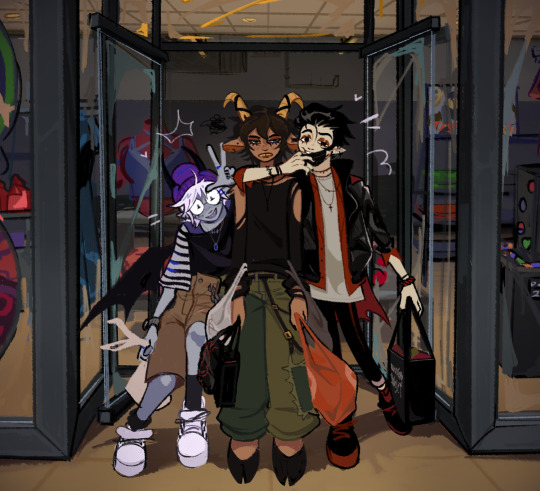
obsessed with the mental image of this. Yahgie is the designated bag holder
#devils candy#ricket pantano#clarence nosophoros#yahgie cabra#also demon hot topic id like to think is called burning subject
122 notes
·
View notes
Text
clarence r nosophoros

23K notes
·
View notes
Text
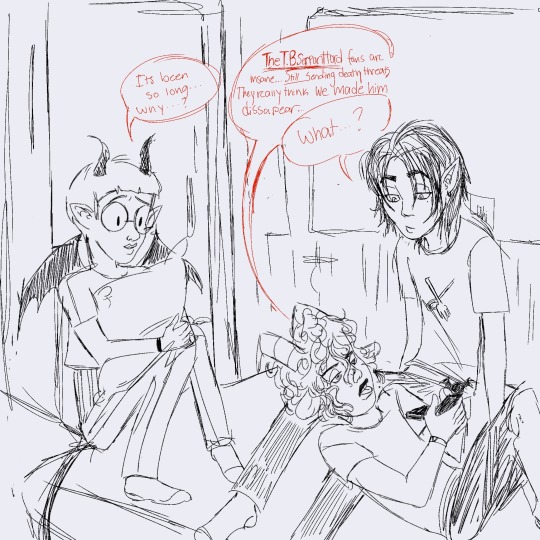
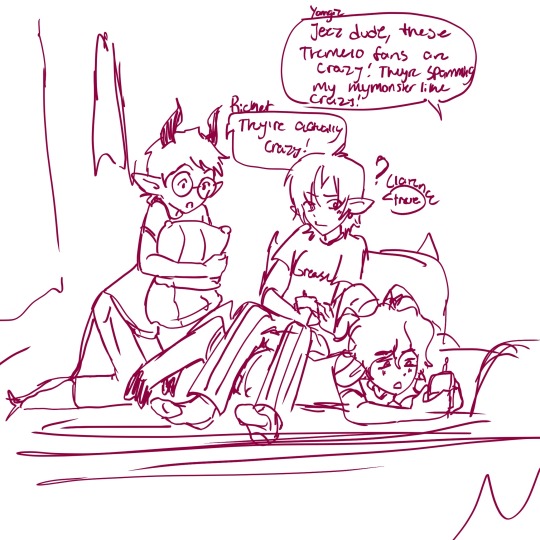
A year difference!
#devils candy#devils candy comic#clarence#Yahgie#ricketpantano#artwork#digital illustration#artist#art
10 notes
·
View notes
Text


trans clarence & nonbinary yahgie pride icons
requested by anon
like/rb if using + credit
22 notes
·
View notes
Text
IN LOVE WITH THEM THEY MEAN SM TO ME GAWDDDDD

Everyone go read Devil’s Candy right neow…I NEED someone to talk abt Pandora and Clarence with they’re so cutesies

#devil’s candy#clarence x pandora#devil’s candy clarence#devil’s candy pandora#i’m going nuts#SHAKES THIS BETWEEN MY TEETH#explodes into confetti#spuukiizyappin
14 notes
·
View notes
Text
LISTEN TO ME!! LISTEN!!

THIS but it’s pandora and clarence pls pls pls someone anyone that can draw it’d be so cute i NEED it in my life 😭💔
#thegreatspuukiiz#devilscandycomic#devils candy#devils candy comic#devil’s candy manga#devil’s candy clarence#clarence nosophoros#devils candy pandora#pandora x clarence#ik you see the vision#pls i beg#i’m on my KNEES 💔#drawing prompt
33 notes
·
View notes
Text
"If you want to direct, watch things." -Kenneth Branagh, Pt. III
Ten years ago I gave myself the challenge of watching 52 films in 52 weeks. I called it, "If you want to direct, watch things." My goal was to learn what I liked, why, and to encourage myself to write.
I exceeded my objective and ended my year with 150 films. I learned a little more about myself and what I could accomplish.
Over the years, I have lost motivation for my personal wellbeing. I've been overworked, stressed, depressed, unable to focus - but I'm feeling better now.
So, now I want to do it again. I want to push myself, challenge myself... because I can, because I'm up to it.
Objective: Watch 150 films/television shows. Goal: To know I can put my mind to something and accomplish it. Movie | Short Film | Television Show | Re-watch
JANUARY [001/150] Saltburn
[002/150] Essex Girls* [003/150] The Heart* [004/150] The Masterpiece* [005/150] Say Hi After You Die* [006/150] The Looming* *Sundance Film Festival
FEBRUARY* [007/150] Nip/Tuck** [008/150] Maggie Moore(s) [009/150] Ladybird [010/150] The Holdovers [011/150] The Lobster [012/150] Shrek [013/150] The Blackening [014/150] How to Lose a Guy in 10 Days [015/150] Triangle of Sadness [016/150] Ticket to Paradise [017/150] The Strange Thing About the Johnsons [018/150] Shrek 2 [019/150] Pitch Black Heist [020/150] Cinderella (1997) [021/150] The Big Year [022/150] Ella Enchanted [023/150] My Neighbor Totoro [024/150] Ratatouille [025/150] Hotel Chevalier [026/150] Fantastic Mr. Fox [027/150] Turning Red [028/150] First Wives Club [029/150] It Comes at Night [030/150] My Red Balloon [031/150] Dumbo [032/150] Call Me by Your Name [033/150] Lady and the Tramp [034/150] Chico Virtual [035/150] Dungeons & Dragons: Honor Among Thieves
MARCH [036/150] The Iron Claw [037/150] The Devil Wears Prada [038/150] Spider-Man [039/150] The Big Shave [040/150] Godzilla x Kong: The New Empire [041/150] The Lorax
APRIL*** [042/150] Monster's Inc. [043/150] Gravity Falls [044/150] Robin Hood [045/150] Inside Out [046/150] MacFarland USA
MAY [047/150] Hannibal [048/150] Zo [049/150] What Happens Later [050/150] Clarence [051/150] Challengers [052/150] Fleabag [053/150] A Dark Place [054/150] The Lost City [055/150] Genie
JUNE**** [056/150] All of Us Strangers [057/150] Boys [058/150] Moonlight [059/150] In+Out [060/150] My Policeman [061/150] Pride [062/150] Garfield [063/150] Our Son [064/150] Acuitzeramo [065/150] Foreigner (Extranjero) [066/150] Shake It All About [067/150] Lavender [068/150] Flu$h [069/150] Staccato [070/150] I Am Syd Stone [071/150] Soft Lad [072/150] Strange Way of Life [073/150] Am I Okay? [074/150] Schitt's Creek [075/150] Spiderman: Into the Spider-Verse [076/150] Inside Out 2
JULY [077/150] Jaws 3D [078/150] Twisters [079/150] Cobra Kai [080/150] Deadpool and Wolverine
AUGUST [081/150] The Door [082/150] Unknown [083/150] Derry Girls [084/150] Sex and the City [085/150] We Bare Bears [086/150] Coffee Shop Names [087/150] Emergency Contact [088/150] La La Land [089/150] Sex and the City [090/150] Manic [091/150] What's a Nice Girl Like You Doing in a Place Like This [092/150] Culpa
SEPTEMBER [093/150] The Perfect Couple [094/150] Beetlejuice Beetlejuice [095/150] Hostel [096/150] Teen Titans [097/150] Dug Days: Carl's Date [098/150] Piper [099/150] Grotesquerie [0100/150] Mr. McMahon
OCTOBER***** [101/150] Saw X [102/150] Don't Breathe 2 [103/150] I Saw the TV Glow [104/150] Escape Room [105/150] Escape Room: Tournament of Champions [106/150] Consume [107/150] Turncoats [108/150] Sunrise [109/150] The Mary Alice Brandon File [110/150] The Groundskeeper [111/150] Masque [112/150] We've Met Before [113/150] The Purge [114/150] The Purge: Anarchy [115/150] Saw Unrated [116/150] The Purge: Election Year [117/150] The Midnight Meat Train [118/150] The Strangers [119/150] Hard Candy [120/150] Saw (.5) [121/150] Captured [123/150] Oh Death [124/150] The First Purge [125/150] The Collector [126/150] Trap [127/150] Sinister [128/150] The Skeleton Key [129/150] Queen of the Damned [130/150] The Forever Purge [131/150] Hannibal Rising [132/150] A Haunting in Venice [133/150] Scream
NOVEMBER [134/150] Palm Springs Weekend [135/150] Sinatra in Palm Springs [136/150] Wall-E
*Monthly Challenge: Watch one movie a day. **Monthly Challenge: Re-watch Nip/Tuck. Did not complete. ***Monthly Challenge: Watch four movies. ****Monthly Challenge: Watch LGBTQ+ movies. *****Monthly Challenge: Watch 31 Spooky-season movies.
2 notes
·
View notes
Text
Tags and Links A-M (In Progress)
Some might still be missing cause I just went down the Smash or Pass tag on here and there's some i forgot to tag
Also I put links for the Lovebrush guys cause I didn't want to list each version
If any links don't work please let me know. I tested some but not all
The * is just me marking where I stopped when making the list
Alice in the Country of Hearts
Elliot March
Amnesia Memories
Kent
Arcana
Asra
Julian
Lucio
Muriel
Nadia
Portia
Arcana Twilight
Sirius
Ayakashi Romance Reborn
Kuya
Toichiro Yuri
Yakumo Koizumi
Backstage Pass
Adam Eaton
John Brandon
Matthew Partridge
Baldur's Gate 2
Anomen Delyrn
Birushana
Minamoto Yoritomo
Blind Griffin
Alexei
Emilio
Giovanni
Blooming Panic
Quest
XYX
Boyfriend Dungeon
Sunder
Bustafellows
Crow "Scarecrow" Miller
Helvetica Orsted
Limbo Fitzgerald
Mozu Shepherd
Shu Lyn O'Keefe
Cafe Enchante
Canus Espada
Ignis Carbunculus
Il Fado de Rie
Kaoru Rindo
Misyr Rex
Charade Maniacs
Akase Kyoya
Futami Ryouichi
Iochi Mizuki
Mamoru Chigasaki
Cinderella Phenomenon
Karma
City of Love Paris
Louise Paquier
Cloud Meadow
Kreyton
Code Realize
Impey Barbicane
Saint Germain
Collar X Malice
Takeru Sasazuka
Court of Darkness
Fenn Luxure
Cupid Parasite
Alan Melville
Gill Lovecraft
Raul Aconite
Ryuki F Keisaiin
Shelby Snail
Cute Demon Crashers
Akki
Kael
Mirari
Dangerous Fellows
Lawrence
Zion
A Date With Death
Grim Reaper
Demonheart
Raze
Sir Brash
Xan'ari
Devil butler with Black Cat
Berrien Cliane
Devil Kiss
Cain
Dragon Age Origins
Zevran
Dragon Age 2
Fenris
Dragon Age Inquisition
Cullen Rutherford
Eldarya
Leiftan
Error 143
Micah Yujin
Even If Tempest
Tyril I Lister
The Fate of Wonderland
White
Fire Emblem Fates
Kaze
Saizo
Fire Emblem Three Houses
Claude Von Riegan
Dimitri Alexandre Blaiddyd
Edelgard Von Hresvelg
Felix Fraldarius
Mercedes von Martritz
Harukanaru Toki no Naka de 4
Hiiragi
Harvest Moon: More Friends of Mineral Town
Cliff
Gray
Hatoful Boyfriend
Kazuaki Nanaki
Shuu Iwamine
Havenless
Noah
Hustle Cat
Grave Serling
I was a Teenage Exocolonist
Marzipan
Ikemen Sengoku
Masamune Date
Sasuke Sarutobi
Ikemen Vampire
Arthur Conan Doyle
Kamigami no Asobi
Anubis Ma'at
Loki Laevatein
Kissed by the Baddest Bidder
Mamoru Kishi
Shuichi Hishikura
Knights of the Old Republic
Carth Onasi
Love Spell Written in the Stars
Enix Gray
Florian Atlas
Jamie Niro
Marcello DiNucci
Lovebrush Chronicles
Ayn Alwyn
Cael Anselm
Clarence Clayden
Lars Rorschach
LoveLink
Blake Bailey
Lover Pretend
Asagi Eiichiro
Kamikubo Kazuma
Makino Harumi
Sena Yukito
Riku Nishijima
LoveUnholyc
Leo
Lullaby of Demonia
Ifrit
Max Gentleman Sexy Business
Samuel Finch
Sinterklaas
Vicki Lestrange
Vlad Nibblesome
MeChat
Wu Xiang
Metro PD: Close To You
Katsuyuki Kyobashi
Monster Prom
Damien Lavey
Moonlight Lovers
Aaron
Beliath
Ethan
Ivan
Neil
Raphael
Vladimir
Mr Love Queen's Choice
Gavin
Kiro
Lucien
Victor
My Candy Love University Life
Castiel
Mystic Messenger
Jumin Han
Saeyoung Choi
Yoosung Kim
Zen
11 notes
·
View notes
Text
HOLY?? WHY AM I JUST NOW SEEING THIS OMGGGGGGGGGGG

11/11/18 source
#clarence r. nosophoros#thegreatspuukiiz#i’m not okay#omg???#look at him#LOOOKKKKK#devil’s candy clarence#devilscandycomic#devils candy#he’s talking to pandora#shhh it’s canon i’m literally nemo
16 notes
·
View notes
Text
It Can't Happen Here, Sinclair Lewis
Chapter 25-26
CHAPTER XXV
HOLIDAYS were invented by the devil, to coax people into the heresy that happiness can be won by taking thought. What was planned as a rackety day for David's first Christmas with his grandparents was, they saw too well, perhaps David's last Christmas with them. Mary had hidden her weeping, but the day before Christmas, when Shad Ledue tramped in to demand of Doremus whether Karl Pascal had ever spoken to him of Communism, Mary came on Shad in the hall, stared at him, raised her hand like a boxing cat, and said with dreadful quietness, "You murderer! I shall kill you and kill Swan!"
For once Shad did not look amused.
To make the holiday as good an imitation of mirth as possible, they were very noisy, but their holly, their tinsel stars on a tall pine tree, their family devotion in a serene old house in a little town, was no different at heart from despairing drunkenness in the city night. Doremus reflected that it might have been just as well for all of them to get drunk and let themselves go, elbows on slopped café tables, as to toil at this pretense of domestic bliss. He now had another thing for which to hate the Corpos—for stealing the secure affection of Christmas.
For noon dinner, Louis Rotenstern was invited, because he was a lorn bachelor and, still more, because he was a Jew, now insecure and snubbed and threatened in an insane dictatorship. (There is no greater compliment to the Jews than the fact that the degree of their unpopularity is always the scientific measure of the cruelty and silliness of the régime under which they live, so that even a commercial-minded money-fondling heavily humorous Jew burgher like Rotenstern is still a sensitive meter of barbarism.) After dinner came Buck Titus, David's most favorite person, bearing staggering amounts of Woolworth tractors and fire engines and a real bow-and-arrow, and he was raucously insisting that Mrs. Candy dance with him what he not very precisely called "the light fantastic," when the hammering sounded at the door.
Aras Dilley tramped in with four men.
"Lookin' for Rotenstern. Oh, that you, Louie? Git your coat and come on—orders."
"What's the idea? What d'you want of him? What's the charge?" demanded Buck, still standing with his arm about Mrs. Candy's embarrassed waist.
"Dunno's there be any charges. Just ordered to headquarters for questioning. District Commissioner Reek in town. Just astin' few people a few questions. Come on, you!"
The hilarious celebrants did not, as they had planned, go out to Lorinda's tavern for skiing. Next day they heard that Rotenstern had been taken to the concentration camp at Trianon, along with that crabbed old Tory, Raymond Pridewell, the hardware dealer.
Both imprisonments were incredible. Rotenstern had been too meek. And if Pridewell had not ever been meek, if he had constantly and testily and loudly proclaimed that he had not cared for Ledue as a hired man and now cared even less for him as a local governor, yet— why, Pridewell was a sacred institution. As well think of dragging the brownstone Baptist Church to prison.
Later, a friend of Shad Ledue took over Rotenstern's shop.
It can happen here, meditated Doremus. It could happen to him. How soon? Before he should be arrested, he must make amends to his conscience by quitting the Informer.
Professor Victor Loveland, once a classicist of Isaiah College, having been fired from a labor camp for incompetence in teaching arithmetic to lumberjacks, was in town, with wife and babies, on his way to a job clerking in his uncle's slate quarry near Fair Haven. He called on Doremus and was hysterically cheerful. He called on Clarence Little—"dropped in to visit with him," Clarence would have said. Now that twitchy, intense jeweler, Clarence, who had been born on a Vermont farm and had supported his mother till she died when he was thirty, had longed to go to college and, especially, to study Greek. Though Loveland was his own age, in the mid-thirties, he looked on him as a combination of Keats and Liddell. His greatest moment had been hearing Loveland read Homer.
Loveland was leaning on the counter. "Gone ahead with your Latin grammar, Clarence?"
"Golly, Professor, it just doesn't seem worth while any more. I guess I'm kind of a weak sister, anyway, but I find that these days it's about all I can do to keep going."
"Me too! And don't call me 'Professor.' I'm a timekeeper in a slate quarry. What a life!"
They had not noticed the clumsy-looking man in plain clothes who had just come in. Presumably he was a customer. But he grumbled, "So you two pansies don't like the way things go nowadays! Don't suppose you like the Corpos! Don't think much of the Chief!" He jabbed his thumb into Loveland's ribs so painfully that Loveland yelped, "I don't think about him at all!"
"Oh, you don't, eh? Well, you two fairies can come along to the courthouse with me!"
"And who may you be?"
"Oh, just an ensign in the M.M.'s, that's all!"
He had an automatic pistol.
Loveland was not beaten much, because he managed to keep his mouth shut. But Little was so hysterical that they laid him on a kitchen table and decorated his naked back with forty slashes of a steel ramrod. They had found that Clarence wore yellow silk underwear, and the M.M.'s from factory and plowland laughed—particularly one broad young inspector who was rumored to have a passionate friendship with a battalion-leader from Nashua who was fat, eyeglassed, and high-pitched of voice.
Little had to be helped into the truck that took Loveland and him to the Trianon concentration camp. One eye was closed and so surrounded with bruised flesh that the M.M. driver said it looked like a Spanish omelet.
The truck had an open body, but they could not escape, because the three prisoners on this trip were chained hand to hand. They lay on the floor of the truck. It was snowing.
The third prisoner was not much like Loveland or Little. His name was Ben Trippen. He had been a mill hand for Medary Cole. He cared no more about the Greek language than did a baboon, but he did care for his six children. He had been arrested for trying to strike Cole and for cursing the Corpo régime when Cole had reduced his wages from nine dollars a week (in pre-Corpo currency) to seven-fifty.
As to Loveland's wife and babies, Lorinda took them in till she could pass the hat and collect enough to send them back to Mrs. Loveland's family on a rocky farm in Missouri. But then things went better. Mrs. Loveland was favored by the Greek proprietor of a lunch-room and got work washing dishes and otherwise pleasing the proprietor, who brilliantined his mustache.
The county administration, in a proclamation signed by Emil Staubmeyer, announced that they were going to regulate the agriculture on the submarginal land high up on Mount Terror. As a starter, half-a-dozen of the poorer families were moved into the large, square, quiet, old house of that large, square, quiet, old farmer, Henry Veeder, cousin of Doremus Jessup. These poorer families had many children, a great many, so that there were four or five persons bedded on the floor in every room of the home where Henry and his wife had placidly lived alone since their own children had grown. Henry did not like it, and said so, not very tactfully, to the M.M.'s herding the refugees. What was worse, the dispossessed did not like it any better. "'Tain't much, but we got a house of our own. Dunno why we should git shoved in on Henry," said one. "Don't expect other folks to bother me, and don't expect to bother other folks. Never did like that fool kind of yellow color Henry painted his barn, but guess that's his business."
So Henry and two of the regulated agriculturists were taken to the Trianon concentration camp, and the rest remained in Henry's house, doing nothing but finish up Henry's large larder and wait for orders.
"And before I'm sent to join Henry and Karl and Loveland, I'm going to clear my skirts," Doremus vowed, along in late January.
He marched in to see County Commissioner Ledue.
"I want to quit the Informer. Staubmeyer has learned all I can teach him."
"Staubmeyer? Oh! You mean Assistant Commissioner Staubmeyer!"
"Chuck it, will you? We're not on parade, and we're not playing soldiers. Mind if I sit down?"
"Don't look like you cared a hell of a lot whether I mind or not! But I can tell you, right here and now, Jessup, without any monkey business about it, you're not going to leave your job. I guess I could find enough grounds for sending you to Trianon for about a million years, with ninety lashes, but—you've always been so stuck on yourself as such an all-fired honest editor, it kind of tickles me to watch you kissing the Chief's foot—and mine!"
"I'll do no more of it! That's certain! And I admit that I deserve your scorn for ever having done it!"
"Well, isn't that elegant! But you'll do just what I tell you to, and like it! Jessup, I suppose you think I had a swell time when I was your hired man! Watching you and your old woman and the girls go off on a picnic while I—oh, I was just your hired man, with dirt in my ears, your dirt! I could stay home and clean up the basement!"
"Maybe we didn't want you along, Shad! Good-morning!"
Shad laughed. There was a sound of the gates of Trianon concentration camp in that laughter.
It was really Sissy who gave Doremus his lead.
He drove to Hanover to see Shad's superior, District Commissioner John Sullivan Reek, that erstwhile jovial and red-faced politician. He was admitted after only half an hour's waiting. He was shocked to see how pale and hesitant and frightened Reek had become. But the Commissioner tried to be authoritative.
"Well, Jessup, what can I do for you?"
"May I be frank?"
"What? What? Why, certainly! Frankness has always been my middle name!"
"I hope so. Governor, I find I'm of no use on the Informer, at Fort Beulah. As you probably know, I've been breaking in Emil Staubmeyer as my successor. Well, he's quite competent to take hold now, and I want to quit. I'm really just in his way."
"Why don't you stick around and see what you can still do to help him? There'll be little jobs cropping up from time to time."
"Because it's got on my nerves to take orders where I used to give 'em for so many years. You can appreciate that, can't you?"
"My God, can I appreciate it? And how! Well, I'll think it over. You wouldn't mind writing little pieces for my own little sheet, at home? I own part of a paper there."
"No! Sure! Delighted!"
("Does this mean that Reek believes the Corpo tyranny is going to blow up, in a revolution, so that he's beginning to trim? Or just that he's fighting to keep from being thrown out?")
"Yes, I can see how you might feel, Brother Jessup."
"Thanks! Would you mind giving me a note to County Commissioner Ledue, telling him to let me out, without prejudice?—making it pretty strong?"
"No. Not a bit. Just wait a minute, ole fellow; I'll write it right now."
Doremus made as little ceremony as possible of leaving the Informer, which had been his throne for thirty-seven years. Staubmeyer was patronizing, Doc Itchitt looked quizzical, but the chapel, headed by Dan Wilgus, shook hands profusely. And so, at sixty-two, stronger and more eager than he had been in all his life, Doremus had nothing to do more important than eating breakfast and telling his grandson stories about the elephant.
But that lasted less than a week. Avoiding suspicion from Emma and Sissy and even from Buck and Lorinda, he took Julian aside:
"Look here, boy. I think it's time now for me to begin doing a little high treason. (Heaven's sake keep all of this under your hat—don't even tip off Sissy!) I guess you know, the Communists are too theocratic for my tastes. But looks to me as though they have more courage and devotion and smart strategy than anybody since the Early Christian Martyrs—whom they also resemble in hairiness and a fondness for catacombs. I want to get in touch with 'em and see if there's any dirty work at the crossroads I can do for 'em—say distributing a few Early Christian tracts by St. Lenin. But of course, theoretically, the Communists have all been imprisoned. Could you get to Karl Pascal, in Trianon, and find out whom I could see?"
Said Julian, "I think I could. Dr. Olmsted gets called in there sometimes on cases—they hate him, because he hates them, but still, their camp doctor is a drunken bum, and they have to have a real doc in when one of their warders busts his wrist beating up some prisoner. I'll try, sir."
Two days afterward Julian returned.
"My God, what a sewer that Trianon place is! I'd waited for Olmsted before, in the car, but I never had the nerve to butt inside. The buildings—they were nice buildings, quite pretty, when the girls' school had them. Now the fittings are all torn out, and they've put up wallboard partitions for cells, and the whole place stinks of carbolic acid and excrement, and the air— there isn't any—you feel as if you were nailed up in a box—I don't know how anybody lives in one of those cells for an hour—and yet there's six men bunked in a cell twelve feet by ten, with a ceiling only seven feet high, and no light except a twenty-five watt, I guess it is, bulb in the ceiling—you couldn't read by it. But they get out for exercise two hours a day—walk around and around the courtyard—they're all so stooped, and they all look so ashamed, as if they'd had the defiance just licked out of 'em—even Karl a little, and you remember how proud and sort of sardonic he was. Well, I got to see him, and he says to get in touch with this man—here, I wrote it down—and for God's sake, burn it up soon as you've memorized it!"
"Was he—had they—?"
"Oh, yes, they've beaten him, all right. He wouldn't talk about it. But there was a scar right across his cheek, from his temple right down to his chin. And I had just a glimpse of Henry Veeder. Remember how he looked—like an oak tree? Now he twitches all the time, and jumps and gasps when he hears a sudden sound. He didn't know me. I don't think he'd know anybody."
Doremus announced to his family and told it loudly in Gath that he was still looking for an option on an apple orchard to which they might retire, and he journeyed southward, with pajamas and a toothbrush and the first volume of Spengler's Decline of the West in a briefcase.
The address given by Karl Pascal was that of a most gentlemanly dealer in altar cloths and priestly robes, who had his shop and office over a tea room in Hartford, Connecticut. He talked about the cembalo and the spinetta di serenata and the music of Palestrina for an hour before he sent Doremus on to a busy engineer constructing a dam in New Hampshire, who sent him to a tailor in a side-street shop in Lynn, who at last sent him to northern Connecticut and to the Eastern headquarters of what was left of the Communists in America.
Still carrying his little briefcase he walked up a greasy hill, impassable to any motorcar, and knocked at the faded green door of a squat New England farm cottage masked in wintry old lilac bushes and spiræa shrubs. A stringy farm wife opened and looked hostile.
"I'd like to speak to Mr. Ailey, Mr. Bailey, or Mr. Cailey."
"None of 'em home. You'll have to come again."
"Then I'll wait. What else should one do, these days?"
"All right. Cmin."
"Thanks. Give them this letter."
(The tailor had warned him, "It vill all sount very foolish, the passvorts und everyt'ing, but if any of the central committee gets caught—" He made a squirting sound and drew his scissors across his throat.)
Doremus sat now in a tiny hall off a flight of stairs steep as the side of a roof; a hall with sprigged wall paper and Currier & Ives prints, and black-painted wooden rocking chairs with calico cushions. There was nothing to read but a Methodist hymnal and a desk dictionary. He knew the former by heart, and anyway, he always loved reading dictionaries—often had one seduced him from editorial-writing. Happily he sat conning:
Phenyl. n., Chem. The univalent radical C6 H5, regarded as the basis of numerous benzene derivatives; as, phenyl hydroxid C6 H5 OH.
Pherecratean. n. A choriambic trimeter catalectic, or catalectic glyconic; composed of a spondee, a choriambus, and a catalectic syllable.
"Well! I never knew any of that before! I wonder if I do now?" thought Doremus contentedly, before he realized that glowering from a very narrow doorway was a very broad man with wild gray hair and a patch over one eye. Doremus recognized him from pictures. He was Bill Atterbury, miner, longshoreman, veteran I.W.W. leader, old A. F. of L. strike-leader, five years in San Quentin and five honored years in Moscow, and reputed now to be the secretary of the illegal Communist Party.
"I'm Mr. Ailey. What can I do for you?" Bill demanded.
He led Doremus into a musty back room where, at a table which was probably mahogany underneath the scars and the clots of dirt, sat a squat man with kinky tow-colored hair and with deep wrinkles in the thick pale skin of his face, and a slender young elegant who suggested Park Avenue.
"Howryuh?" said Mr. Bailey, in a Russian-Jewish accent. Of him Doremus knew nothing save that he was not named Bailey.
"Morning," snapped Mr. Cailey—whose name was Elphrey, if Doremus guessed rightly, and who was the son of a millionaire private banker, the brother of one explorer, one bishop's wife, and one countess, and himself a former teacher of economics in the University of California.
Doremus tried to explain himself to these hard-eyed, quick-glancing plotters of ruin.
"Are you willing to become a Party member, in the extremely improbable case that they accept you, and to take orders, any orders, without question?" asked Elphrey, so suavely.
"Do you mean, Am I willing to kill and steal?"
"You've been reading detective stories about the 'Reds'! No. What you'd have to do would be much more difficult than the amusement of using a tommy-gun. Would you be willing to forget you ever were a respectable newspaper editor, giving orders, and walk through the snow, dressed like a bum, to distribute seditious pamphlets—even if, personally, you should believe the pamphlets were of no slightest damn good to the Cause?"
"Why, I—I don't know. Seems to me that as a newspaperman of quite a little training—"
"Hell! Our only trouble is keeping out the 'trained newspapermen'! What we need is trained bill-posters that like the smell of flour paste and hate sleeping. And—but you're a little old for this— crazy fanatics that go out and start strikes, knowing they'll get beaten up and thrown in the bull pen."
"No, I guess I—Look here. I'm sure Walt Trowbridge will be joining up with the Socialists and some of the left-wing radical ex-Senators and the Farmer-Laborites and so on—"
Bill Atterbury guffawed. It was a tremendous, somehow terrifying blast. "Yes, I'm sure they'll join up—all the dirty, sneaking, half-headed, reformist Social Fascists like Trowbridge, that are doing the work of the capitalists and working for war against Soviet Russia without even having sense enough to know they're doing it and to collect good pay for their crookedness!"
"I admire Trowbridge!" snarled Doremus.
"You would!"
Elphrey rose, almost cordial, and dismissed Doremus with, "Mr. Jessup, I was brought up in a sound bourgeois household myself, unlike these two roughnecks, and I appreciate what you're trying to do, even if they don't. I imagine that your rejection of us is even firmer than our rejection of you!"
"Dot's right, Comrade Elphrey. Both you and dis fellow got ants in your bourjui pants, like your Hugh Johnson vould say!" chuckled the Russian Mr. Bailey.
"But I just wonder if Walt Trowbridge won't be chasing out Buzz Windrip while you boys are still arguing about whether Comrade Trotzky was once guilty of saying mass facing the north? Good-day!" said Doremus.
When he recounted it to Julian, two days later, and Julian puzzled, "I wonder whether you won or they did?" Doremus asserted, "I don't think anybody won—except the ants! Anyway, now I know that man is not to be saved by black bread alone but by everything that proceedeth out of the mouth of the Lord our God.... Communists, intense and narrow; Yankees, tolerant and shallow; no wonder a Dictator can keep us separate and all working for him!"
Even in the 1930's, when it was radiantly believed that movies and the motorcar and glossy magazines had ended the provinciality of all the larger American villages, in such communities as Fort Beulah all the retired business men who could not afford to go to Europe or Florida or California, such as Doremus, were as aimless as an old dog on Sunday afternoon with the family away. They poked uptown to the shops, the hotel lobbies, the railway station, and at the barber shop were pleased rather than irritated when they had to wait a quarter-hour for the tri-weekly shave. There were no cafés as there would have been in Continental Europe, and no club save the country club, and that was chiefly a sanctuary for the younger people in the evening and late afternoons.
The superior Doremus Jessup, the bookman, was almost as dreary in retirement as Banker Crowley would have been.
He did pretend to play golf, but he could not see any particular point in stopping a good walk to wallop small balls and, worse, the links were now bright with M.M. uniforms. And he hadn't enough brass, as no doubt Medary Cole would have, to feel welcome hour on hour in the Hotel Wessex lobby.
He stayed in his third-story study and read as long as his eyes would endure it. But he irritably felt Emma's irritation and Mrs. Candy's ire at having a man around the house all day. Yes! He'd get what he could for the house and for what small share in Informer stock the government had left him when they had taken it over, and go—well, just go—the Rockies or anywhere that was new.
But he realized that Emma did not at all wish to go new places; and realized that the Emma to whose billowy warmth it had been comforting to come home after the office, bored him and was bored by him when he was always there. The only difference was that she did not seem capable of admitting that one might, without actual fiendishness or any signs of hot-footing it for Reno, be bored by one's faithful spouse.
"Why don't you drive out and see Buck or Lorinda?" she suggested.
"Don't you ever get a little jealous of my girl, Linda?" he said, very lightly—because he very heavily wanted to know.
She laughed. "You? At your age? As if anybody thought you could be a lover!"
Well, Lorinda thought so, he raged, and promptly he did "drive out and see her," a little easier in mind about his divided loyalties.
Only once did he go back to the Informer office.
Staubmeyer was not in sight, and it was evident that the real editor was that sly bumpkin, Doc Itchitt, who didn't even rise at Doremus's entrance nor listen when Doremus gave his opinion of the new make-up of the rural-correspondence pages.
That was an apostasy harder to endure than Shad Ledue's, for Shad had always been rustically certain that Doremus was a fool, almost as bad as real "city folks," while Doc Itchitt had once appreciated the tight joints and smooth surfaces and sturdy bases of Doremus's craftsmanship.
Day on day he waited. So much of a revolution for so many people is nothing but waiting. That is one reason why tourists rarely see anything but contentment in a crushed population. Waiting, and its brother death, seem so contented.
For several days now, in late February, Doremus had noticed the insurance man. He said he was a Mr. Dimick; a Mr. Dimick of Albany. He was a gray and tasteless man, in gray and dusty and wrinkled clothes, and his pop-eyes stared with meaningless fervor. All over town you met him, at the four drugstores, at the shoe-shine parlor, and he was always droning, "My name is Dimick—Mr. Dimick of Albany—Albany, New York. I wonder if I can interest you in a wonnerful new form of life-insurance policy. Wonnerful!" But he didn't sound as though he himself thought it was very wonnerful.
He was a pest.
He was always dragging himself into some unwelcoming shop, and yet he seemed to sell few policies, if any.
Not for two days did Doremus perceive that Mr. Dimick of Albany managed to meet him an astonishing number of times a day. As he came out of the Wessex, he saw Mr. Dimick leaning against a lamppost, ostentatiously not looking his way, yet three minutes later and two blocks away, Mr. Dimick trailed after him into the Vert Mont Pool & Tobacco Headquarters, and listened to Doremus's conversation with Tom Aiken about fish hatcheries.
Doremus was suddenly cold. He made it a point to sneak uptown that evening and saw Mr. Dimick talking to the driver of a Beulah-Montpelier bus with an intensity that wasn't in the least gray. Doremus glared. Mr. Dimick looked at him with watery eyes, croaked, "Devenin', Mr. D'remus; like t' talk t' you about insurance some time when you got the time," and shuffled away.
Later, Doremus took out and cleaned his revolver, said, "Oh, rats!" and put it away. He heard a ring as he did so, and went downstairs to find Mr. Dimick sitting on the oak hat rack in the hall, rubbing his hat.
"I'd like to talk to you, if y'ain't too busy," whined Mr. Dimick.
"All right. Go in there. Sit down."
"Anybody hear us?"
"No! What of it?"
Mr. Dimick's grayness and lassitude fell away. His voice was sharp:
"I think your local Corpos are on to me. Got to hustle. I'm from Walt Trowbridge. You probably guessed—I've been watching you all week, asking about you. You've got to be Trowbridge's and our representative here. Secret war against the Corpos. The 'N.U.,' the 'New Underground,' we call it—like secret Underground that got the slaves into Canada before the Civil War. Four divisions: printing propaganda, distributing it, collecting and exchanging information about Corpo outrages, smuggling suspects into Canada or Mexico. Of course you don't know one thing about me. I may be a Corpo spy. But look over these credentials and telephone your friend Mr. Samson of the Burlington Paper Company. God's sake be careful! Wire may be tapped. Ask him about me on the grounds you're interested in insurance. He's one of us. You're going to be one of us! Now phone!"
Doremus telephoned to Samson: "Say, Ed, is a fellow named Dimick, kind of weedy-looking, pop-eyed fellow, all right? Shall I take his advice on insurance?"
"Yes. Works for Walbridge. Sure. You can ride along with him."
"I'm riding!"
CHAPTER XXVI
THE Informer composing room closed down at eleven in the evening, for the paper had to be distributed to villages forty miles away and did not issue a later city edition. Dan Wilgus, the foreman, remained after the others had gone, setting a Minute Man poster which announced that there would be a grand parade on March ninth, and incidentally that President Windrip was defying the world.
Dan stopped, looked sharply about, and tramped into the storeroom. In the light from a dusty electric bulb the place was like a tomb of dead news, with ancient red-and-black posters of Scotland county fairs and proofs of indecent limericks pasted on the walls. From a case of eight-point, once used for the setting of pamphlets but superseded by a monotype machine, Dan picked out bits of type from each of several compartments, wrapped them in scraps of print paper, and stored them in the pocket of his jacket. The raped type boxes looked only half filled, and to make up for it he did something that should have shocked any decent printer even if he were on strike. He filled them up with type not from another eight-point case, but with old ten-point.
Daniel, the large and hairy, thriftily pinching the tiny types, was absurd as an elephant playing at being a hen.
He turned out the lights on the third floor and clumped downstairs. He glanced in at the editorial rooms. No one was there save Doc Itchitt, in a small circle of light that through the visor of his eye shade cast a green tint on his unwholesome face. He was correcting an article by the titular editor, Ensign Emil Staubmeyer, and he snickered as he carved it with a large black pencil. He raised his head, startled.
"Hello, Doc."
"Hello, Dan. Staying late?"
"Yuh. Just finished some job work. G'night."
"Say, Dan, do you ever see old Jessup, these days?"
"Don't know when I've seen him, Doc. Oh yes, I ran into him at the Rexall store, couple days ago."
"Still as sour as ever about the régime?"
"Oh, he didn't say anything. Darned old fool! Even if he don't like all the brave boys in uniform, he ought to see the Chief is here for keeps, by golly!"
"Certainly ought to! And it's a swell régime. Fellow can get ahead in newspaper work now, and not be held back by a bunch of snobs that think they're so doggone educated just because they went to college!"
"That's right. Well, hell with Jessup and all the old stiffs. G'night, Doc!"
Dan and Brother Itchitt unsmilingly gave the M.M. salute, arms held out. Dan thumped down to the street and homeward. He stopped in front of Billy's Bar, in the middle of a block, and put his foot up on the hub of a dirty old Ford, to tie his shoelace. As he tied it—after having untied it—he looked up and down the street, emptied the bundles in his pockets into a battered sap bucket on the front seat of the car, and majestically moved on.
Out of the bar came Pete Vutong, a French-Canadian farmer who lived up on Mount Terror. Pete was obviously drunk. He was singing the pre-historic ditty "Hi lee, hi low" in what he conceived to be German, viz.: "By unz gays immer, yuh longer yuh slimmer." He was staggering so that he had to pull himself into the car, and he steered in fancy patterns till he had turned the corner. Then he was amazingly and suddenly sober; and amazing was the speed with which the Ford clattered out of town.
Pete Vutong wasn't a very good Secret Agent. He was a little obvious. But then, Pete had been a spy for only one week.
In that week Dan Wilgus had four times dropped heavy packages into a sap bucket in the Ford.
Pete passed the gate to Buck Titus's domain, slowed down, dropped the sap bucket into a ditch, and sped home.
Just at dawn, Buck Titus, out for a walk with his three Irish wolfhounds, kicked up the sap bucket and transferred the bundles to his own pocket.
And next afternoon Dan Wilgus, in the basement of Buck's house, was setting up, in eight-point, a pamphlet entitled "How Many People Have the Corpos Murdered?" It was signed "Spartan," and Spartan was one of several pen names of Mr. Doremus Jessup.
They were all—all the ringleaders of the local chapter of the New Underground—rather glad when once, on his way to Buck's, Dan was searched by M.M.'s unfamiliar to him, and on him was found no printing-material, nor any documents more incriminating than cigarette papers.
The Corpos had made a regulation licensing all dealers in printing machinery and paper and compelling them to keep lists of purchasers, so that except by bootlegging it was impossible to get supplies for the issuance of treasonable literature. Dan Wilgus stole the type; Dan and Doremus and Julian and Buck together had stolen an entire old hand printing-press from the Informer basement; and the paper was smuggled from Canada by that veteran bootlegger, John Pollikop, who rejoiced at being back in the good old occupation of which repeal had robbed him.
It is doubtful whether Dan Wilgus would ever have joined anything so divorced as this from the time clock and the office cuspidors out of abstract indignation at Windrip or County Commissioner Ledue. He was moved to sedition partly by fondness for Doremus and partly by indignation at Doc Itchitt, who publicly rejoiced because all the printers' unions had been sunk in the governmental confederations. Or perhaps because Doc jeered at him personally on the few occasions—not more than once or twice a week—when there was tobacco juice on his shirt front.
Dan grunted to Doremus, "All right, boss, I guess maybe I'll come in with you. And say, when we get this man's revolution going, let me drive the tumbril with Doc in it. Say, remember A Tale of Two Cities? Good book. Say, how about getting out a humorous life of Windrip? You'd just have to tell the facts!"
Buck Titus, pleased as a boy invited to go camping, offered his secluded house and, in especial, its huge basement for the headquarters of the New Underground, and Buck, Dan, and Doremus made their most poisonous plots with the assistance of hot rum punches at Buck's fireplace.
The Fort Beulah cell of the N.U., as it was composed in mid-March, a couple of weeks after Doremus had founded it, consisted of himself, his daughters, Buck, Dan, Lorinda, Julian Falck, Dr. Olmsted, John Pollikop, Father Perefixe (and he argued with the agnostic Dan, the atheist Pollikop, more than ever he had with Buck), Mrs. Henry Veeder, whose farmer husband was in Trianon Concentration Camp, Harry Kindermann, the dispossessed Jew, Mungo Kitterick, that most un-Jewish and un-Socialistic lawyer, Pete Vutong and Daniel Babcock, farmers, and some dozen others. The Reverend Mr. Falck, Emma Jessup, and Mrs. Candy, were more or less unconscious tools of the N.U. But whoever they were, of whatever faith or station, Doremus found in all of them the religious passion he had missed in the churches; and if altars, if windows of many-colored glass, had never been peculiarly holy objects to him, he understood them now as he gloated over such sacred trash as scarred type and a creaking hand press.
Once it was Mr. Dimick of Albany again; once, another insurance agent—who guffawed at the accidental luck of insuring Shad Ledue's new Lincoln; once it was an Armenian peddling rugs; once, Mr. Samson of Burlington, looking for pine-slashing for paper pulp; but whoever it was, Doremus heard from the New Underground every week. He was busy as he had never been in newspaper days, and happy as on youth's adventure in Boston.
Humming and most cheerful, he ran the small press, with the hearty bump-bump-bump of the foot treadle, admiring his own skill as he fed in the sheets. Lorinda learned from Dan Wilgus to set type, with more fervor than accuracy about ei and ie. Emma and Sissy and Mary folded news sheets and sewed up pamphlets by hand, all of them working in the high old brick-walled basement that smelled of sawdust and lime and decaying apples.
Aside from pamphlets by Spartan, and by Anthony B. Susan—who was Lorinda, except on Fridays—their chief illicit publication was Vermont Vigilance, a four-page weekly which usually had only two pages and, such was Doremus's unfettered liveliness, came out about three times a week. It was filled with reports smuggled to them from other N.U. cells, and with reprints from Walt Trowbridge's Lance for Democracy and from Canadian, British, Swedish, and French papers, whose correspondents in America got out, by long-distance telephone, news which Secretary of Education Macgoblin, head of the government press department, spent a good part of his time denying. An English correspondent sent news of the murder of the president of the University of Southern Illinois, a man of seventy-two who was shot in the back "while trying to escape," out of the country by long-distance telephone to Mexico City, from which the story was relayed to London.
Doremus discovered that neither he nor any other small citizen had been hearing one hundredth of what was going on in America. Windrip & Co. had, like Hitler and Mussolini, discovered that a modern state can, by the triple process of controlling every item in the press, breaking up at the start any association which might become dangerous, and keeping all the machine guns, artillery, armored automobiles, and aeroplanes in the hands of the government, dominate the complex contemporary population better than had ever been done in medieval days, when rebellious peasantry were armed only with pitchforks and good-will, but the State was not armed much better.
Dreadful, incredible information came in to Doremus, until he saw that his own life, and Sissy's and Lorinda's and Buck's, were unimportant accidents.
In North Dakota, two would-be leaders of the farmers were made to run in front of an M.M. automobile, through February drifts, till they dropped breathless, were beaten with a tire pump till they staggered on, fell again, then were shot in the head, their blood smearing the prairie snow.
President Windrip, who was apparently becoming considerably more jumpy than in his old, brazen days, saw two of his personal bodyguard snickering together in the anteroom of his office and, shrieking, snatching an automatic pistol from his desk, started shooting at them. He was a bad marksman. The suspects had to be finished off by the pistols of their fellow guards.
A crowd of young men, not wearing any sort of uniforms, tore the clothes from a nun on the station plaza in Kansas City and chased her, smacking her with bare hands. The police stopped them after a while. There were no arrests.
In Utah a non-Mormon County Commissioner staked out a Mormon elder on a bare rock where, since the altitude was high, the elder at once shivered and felt the glare rather bothersome to his eyes— since the Commissioner had thoughtfully cut off his eyelids first. The government press releases made much of the fact that the torturer was rebuked by the District Commissioner and removed from his post. It did not mention that he was reappointed in a county in Florida.
The heads of the reorganized Steel Cartel, a good many of whom had been officers of steel companies in the days before Windrip, entertained Secretary of Education Macgoblin and Secretary of War Luthorne with an aquatic festival in Pittsburgh. The dining room of a large hotel was turned into a tank of rose-scented water, and the celebrants floated in a gilded Roman barge. The waitresses were naked girls, who amusingly swam to the barge holding up trays and, more often, wine buckets.
Secretary of State Lee Sarason was arrested in the basement of a handsome boys' club in Washington on unspecified charges by a policeman who apologized as soon as he recognized Sarason, and released him, and who that night was shot in his bed by a mysterious burglar.
Albert Einstein, who had been exiled from Germany for his guilty devotion to mathematics, world peace, and the violin, was now exiled from America for the same crimes.
Mrs. Leonard Nimmet, wife of a Congregational pastor in Lincoln, Nebraska, whose husband had been sent to concentration camp for a pacifist sermon, was shot through the door and killed when she refused to open to an M.M. raiding section looking for seditious literature.
In Rhode Island, the door of a small orthodox synagogue in a basement was locked from the outside after thin glass containers of carbon monoxide had been thrown in. The windows had been nailed shut, and anyway, the nineteen men in the congregation did not smell the gas until too late. They were all found slumped to the floor, beards sticking up. They were all over sixty.
Tom Krell—but his was a really nasty case, because he was actually caught with a copy of Lance for Democracy and credentials proving that he was a New Underground messenger—strange thing, too, because everybody had respected him as a good, decent, unimaginative baggageman at a village railroad depot in New Hampshire—was dropped down a well with five feet of water in it, a smooth-sided cement well, and just left there.
Ex-Supreme Court Justice Hoblin of Montana was yanked out of bed late at night and examined for sixty hours straight on a charge that he was in correspondence with Trowbridge. It was said that the chief examiner was a man whom, years before, Judge Hoblin had sentenced for robbery with assault.
In one day Doremus received reports that four several literary or dramatic societies—Finnish, Chinese, Iowan, and one belonging to a mixed group of miners on the Mesaba Range, Minnesota—had been broken up, their officers beaten, their clubrooms smashed up, and their old pianos wrecked, on the charge that they possessed illegal arms, which, in each case, the members declared to be antiquated pistols used in theatricals. And in that week three people were arrested—in Alabama, Oklahoma, and New Jersey—for the possession of the following subversive books: The Murder of Roger Ackroyd, by Agatha Christie (and fair enough too, because the sister-in-law of a county commissioner in Oklahoma was named Ackroyd); Waiting for Lefty, by Clifford Odets; and February Hill, by Victoria Lincoln.
"But plenty things like this happened before Buzz Windrip ever came in, Doremus," insisted John Pollikop. (Never till they had met in the delightfully illegal basement had he called Doremus anything save "Mr. Jessup.") "You never thought about them, because they was just routine news, to stick in your paper. Things like the sharecroppers and the Scottsboro boys and the plots of the California wholesalers against the agricultural union and dictatorship in Cuba and the way phony deputies in Kentucky shot striking miners. And believe me, Doremus, the same reactionary crowd that put over those crimes are just the big boys that are chummy with Windrip. And what scares me is that if Walt Trowbridge ever does raise a kinda uprising and kick Buzz out, the same vultures will get awful patriotic and democratic and parliamentarian along with Walt, and sit in on the spoils just the same."
"So Karl Pascal did convert you to Communism before he got sent to Trianon," jeered Doremus.
John Pollikop jumped four straight feet up in the air, or so it looked, and came down screaming, "Communism! Never get 'em to make a United Front! W'y, that fellow Pascal—he was just a propagandist, and I tell you—I tell you—"
Doremus's hardest job was the translation of items from the press in Germany, which was most favorable to the Corpos. Sweating, even in the March coolness in Buck's high basement, Doremus leaned over a kitchen table, ruffling through a German-English lexicon, grunting, tapping his teeth with a pencil, scratching the top of his head, looking like a schoolboy with a little false gray beard, and wailing to Lorinda, "Now how in the heck would you translate 'Er erhält* [sic] noch immer eine zweideutige Stellung den Juden gegenüber'?" She answered, "Why, darling, the only German I know is the phrase that Buck taught me for 'God bless you'—'Verfluchter Schweinehund.'"
Er erhält noch immer... = "he still obtains..." Lewis evidently intends: Er hält sich noch immer an... = "he still maintains..." —RG]
He translated word for word, from the Völkischer Beobachter, and later turned into comprehensible English, this gratifying tribute to his Chief and Inspirer:
America has a brilliant beginning begun. No one congratulates President Windrip with greater sincerity than we Germans. The tendency points as goal to the founding of a Folkish state. Unfortunately is the President not yet prepared with the liberal tradition to break. He holds still ever a two-meaning attitude the Jews visavis. We can but presume that logically this attitude change must as the movement forced is the complete consequences of its philosophy to draw. Ahasaver the Wandering Jew will always the enemy of a free self-conscious people be, and America will also learn that one even so much with Jewry compromise can as with the Bubonic plague.
From the New Masses, still published surreptitiously by the Communists, at the risk of their lives, Doremus got many items about miners and factory workers who were near starvation and who were imprisoned if they so much as criticized a straw boss.... But most of the New Masses, with a pious smugness unshaken by anything that had happened since 1935, was given over to the latest news about Marx, and to vilifying all agents of the New Underground, including those who had been clubbed and jailed and killed, as "reactionary stool pigeons for Fascism," and it was all nicely decorated with a Gropper cartoon showing Walt Trowbridge, in M.M. uniform, kissing the foot of Windrip.
The news bulletins came to Doremus in a dozen insane ways—carried by messengers on the thinnest of flimsy tissue paper; mailed to Mrs. Henry Veeder and to Daniel Babcock between the pages of catalogues, by an N.O. operative who was a clerk in the mail-order house of Middlebury & Roe; shipped in cartons of toothpaste and cigarettes to Earl Tyson's drugstore—one clerk there was an N.U. agent; dropped near Buck's mansion by a tough-looking and therefore innocent-looking driver of an interstate furniture-moving truck. Come by so precariously, the news had none of the obviousness of his days in the office when, in one batch of A.P. flimsies, were tidings of so many millions dead of starvation in China, so many statesmen assassinated in central Europe, so many new churches built by kind-hearted Mr. Andrew Mellon, that it was all routine. Now, he was like an eighteenth-century missionary in northern Canada, waiting for the news that would take all spring to travel from Bristol and down Hudson Bay, wondering every instant whether France had declared war, whether Her Majesty had safely given birth.
Doremus realized that he was hearing, all at once, of the battle of Waterloo, the Diaspora, the invention of the telegraph, the discovery of bacilli, and the Crusades, and if it took him ten days to get the news, it would take historians ten decades to appraise it. Would they not envy him, and consider that he had lived in the very crisis of history? Or would they just smile at the flag-waving children of the 1930's playing at being national heroes? For he believed that these historians would be neither Communists nor Fascists nor bellicose American or English Nationalists but just the sort of smiling Liberals that the warring fanatics of today most cursed as weak waverers.
In all this secret tumult Doremus's most arduous task was to avoid suspicions that might land him in concentration camp, and to give appearance of being just the harmless old loafer he veritably had been, three weeks ago. Befogged with sleep because he had worked all night at headquarters, he yawned all afternoon in the lobby of the Hotel Wessex and discussed fishing—the picture of a man too discouraged to be a menace.
He dropped now and then, on evenings when there was nothing to do at Buck's and he could loaf in his study at home and shamefully let himself be quiet and civilized, into renewed longing for the Ivory Tower. Often, not because it was a great poem but because it was the first that, when he had been a boy, had definitely startled him by evoking beauty, he reread Tennyson's "Arabian Nights":
A realm of pleasance, many a mound And many a shadow-chequered lawn Full of the city's stilly sound, And deep myrrh-thickets blowing round And stately cedar, tamarisks, Thick rosaries of scented thorn, Tall orient shrubs, and obelisks Graven with emblems of the time, In honor of the golden prime Of good Haroun Alraschid.
Awhile then he could wander with Romeo and Jurgen, with Ivanhoe and Lord Peter Wimsey; the Piazza San Marco he saw, and immemorial towers of Bagdad that never were; with Don John of Austria he was going forth to war, and he took the golden road to Samarcand without a visa.
"But Dan Wilgus setting type on proclamations of rebellion, and Buck Titus distributing them at night on a motorcycle, may be as romantic as Xanadu... living in a blooming epic, right now, but no Homer come up from the city room yet to write it down!"
Whit Bibby was an ancient and wordless fishmonger, and as ancient appeared his horse, though it was by no means silent, but given to a variety of embarrassing noises. For twenty years his familiar wagon, like the smallest of cabooses, had conveyed mackerel and cod and lake trout and tinned oysters to all the farmsteads in the Beulah Valley. To have suspected Whit Bibby of seditious practices would have been as absurd as to have suspected the horse. Older men remembered that he had once been proud of his father, a captain in the Civil War—and afterward a very drunken failure at farming— but the young fry had forgotten that there ever had been a Civil War.
Unconcealed in the sunshine of the late-March afternoon that touched the worn and ashen snow, Whit jogged up to the farmhouse of Truman Webb. He had left ten orders of fish, just fish, at farms along the way, but at Webb's he also left, not speaking of it, a bundle of pamphlets wrapped in very fishy newspaper.
By next morning these pamphlets had all been left in the post boxes of farmers beyond Keezmet, a dozen miles away.
Late the next night, Julian Falck drove Dr. Olmsted to the same Truman Webb's. Now Mr. Webb had an ailing aunt. Up to a fortnight ago she had not needed the doctor often, but as all the countryside could, and decidedly did, learn from listening in on the rural party telephone line, the doctor had to come every three or four days now.
"Well, Truman, how's the old lady?" Dr. Olmsted called cheerily.
From the front stoop Webb answered softly, "Safe! Shoot! I've kept a good lookout."
Julian rapidly slid out, opened the rumble seat of the doctor's car, and there was the astonishing appearance from the rumble of a tall man in urban morning coat and striped trousers, a broad felt hat under his arm, rising, rubbing himself, groaning with the pain of stretching his cramped body. The doctor said:
"Truman, we've got a pretty important Eliza, with the bloodhounds right after him, tonight! Congressman Ingram—Comrade Webb."
"Huh! Never thought I'd live to be called one of these 'Comrades.' But mighty pleased to see you, Congressman. We'll put you across the border in Canada in two days—we've got some paths right through the woods along the border—and there's some good hot beans waiting for you right now."
The attic in which Mr. Ingram slept that night, an attic approached by a ladder concealed behind a pile of trunks, was the "underground station" which, in the 1850's, when Truman's grandfather was agent, had sheltered seventy-two various black slaves escaping to Canada, and on the wall above Ingram's weary threatened head was still to be seen, written in charcoal long ago, "Thou preparest a table for me in the presence of mine enemies."
It was a little after six in the evening, near Tasbrough & Scarlett's quarries. John Pollikop, with his wrecker car, was towing Buck Titus, in his automobile. They stopped now and then, and John looked at the motor in Buck's car very ostentatiously, in the sight of M.M. patrols, who ignored so obvious a companionship. They stopped once at the edge of Tasbrough's deepest pit. Buck strolled about, yawning, while John did some more tinkering. "Right!" snapped Buck. Both of them leaped at the over-large toolbox in the back of John's car, lifted out each an armful of copies of Vermont Vigilance and hurled them over the edge of the quarry. They scattered in the wind.
Many of them were gathered up and destroyed by Tasbrough's foremen, next morning, but at least a hundred, in the pockets of quarrymen, were started on their journey through the world of Fort Beulah workmen.
Sissy came into the Jessup dining room wearily rubbing her forehead. "I've got the story, Dad. Sister Candy helped me. Now we'll have something good to send on to other agents. Listen! I've been quite chummy with Shad. No! Don't blow up! I know just how to yank his gun out of his holster if I should ever need to. And he got to boasting, and he told me Frank Tasbrough and Shad and Commissioner Reek were all in together on the racket, selling granite for public buildings, and he told me—you see, he was sort of boasting about how chummy he and Mr. Tasbrough have become—how Mr. Tasbrough keeps all the figures on the graft in a little red notebook in his desk—of course old Franky would never expect anybody to search the house of as loyal a Corpo as him! Well, you know Mrs. Candy's cousin is working for the Tasbroughs for a while, and damn if—"
("Sis-sy!")
"—these two old gals didn't pinch the lil red notebook this afternoon, and I photographed every page and had 'em stick it back! And the only comment our Candy makes is, 'That stove t' the Tasbroughs' don't draw well. Couldn't bake a decent cake in a stove like that!'"
0 notes
Text
hay! HAY! posted my first devils candy fanfic a few days ago!!
i’m still trying to get used to writing for these characters and this world but i love pandora and clarence sm so i had to write something for them ^^
#ao3 writer#dudaroar#devils candy#devilscandycomic#devils candy pandora#clarence x pandora#clarence r. nosophoros#THEY ARE IN LOVE#devil’s candy manga
10 notes
·
View notes
Text










♔ || CLARENCE NOSOPHOROS ICONS
250x250 || boyfreak || bordered circle
like / rb + credit + read dni if using
requested by anon !!
#clarence nosophoros#devil's candy#devils candy#icons#pride edit#pride icons#boyfreak#mogai#xenogender#xenogenders
42 notes
·
View notes
Text

does that devil ur candy? huh?
103 notes
·
View notes